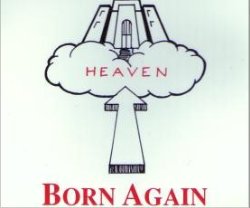I set my brandy down and said: "Dr. Simpson, do you believe in God?"
He just perceptibly raised his eyes, as if in entreaty to Heaven to spare him at least this. It took me some years to attain his mood and understand my blunder. He resented such questions as people do who have thought a great deal about them. The superficial and the slipshod have ready answers, but those lookng this complex life straight in the eye acquire a wealth of perception so composed of delicately balanced contradictions that they dread, or resent, the call to couch any part of it in a bland generalization.
I think of this passage often now, while considering salvation.
It certainly seemed like an easy answer when I was young. My first encounter with the traditional, evangelical "plan" of salvation occurred midway through Vacation Bible School at the small Baptist church of my youth. In what became somewhat of a ritual to be revisited every year, the pastor would lug out an easel and a dry-erase board and with his four colored markers, he would crudely draw the earth suspended above a void of black with the word "HELL" written within in, and stretched above the planet would be written "HEAVEN," nestled in bubbly clouds. A stick figure would stand upon the earth, and the pastor would explain to the older VBS'ers (normally Kindergarten through sixth grade, those who were deemed able to comprehend this weighty concept) that there existed a separation between Heaven and those on earth. He would shade in this demilitarized zone of separation with the black marker and write "SIN" within it. He would then go on to explain how Jesus' death on the cross bridged this gap. Arrows shooting from the stick figure toward Hell were reversed, pointing to Heaven, and the black span of sin was pierced with a red cross stretched between earth and eternity.
Cut and dried; tried and true. The basic foundation of Christianity.
The one vaguery that I did not recognize at the time (and perhaps this was the blessing of having a child-like faith - I was not yet cursed to dwell within reason's cold realm) was the belief issue. What did it take to navigate through this black void of sin upon the blessing of the red cross? The answer: belief in Jesus, specifically illustrated in a personal prayer that he forgive me of my sins. Which sins? All of them? Was it belief that he could forgive me, or would forgive me? Was it more than belief regarding supplication to him, but belief in his life-changing power? And what did such a changed life look like?
The question I struggle with now is, what form does this prayer for forgiveness take in people's individual lives. Many believe it must be as black and white as it was presented me as a child, but these are often the same people who care nothing for discipleship - really learning to live like Jesus - and would rather check off as many names on their outreach lists as possible; if they've prayed the prayer, God has got to let them in. After all, through the grace of the cross, we have a deal ...
The second problem with viewing salvation as obtainable only by means of a prayer for forgiveness is that the actual concept to which Christ called us becomes an afterthought. The gospel accounts are replete with instances of Christ commanding his followers to do just that, follow him. And his description of what this actually looks like, use of hyperbole notwithstanding, rarely includes the saying of a prayer. Instead, it involves people feeding the hungry, giving to the poor, selling their possessions, forgetting their family for the sake of followship.
This is enough for now, but in a few days I will be returning to these two problems, especially in examining the lives of people most Christians today do not consider to be Christians, such as Gandhi and Rabbi Abraham Heschel. The question I will pose is: why are such people as them bound for HELL, and people like Pat Robertson, Jerry Falwell, and the despicable Vernon Bowen soaring to HEAVEN?



No comments:
Post a Comment